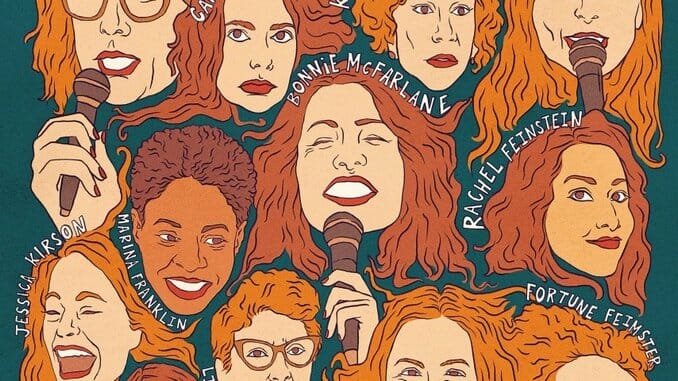FX’s Stand-up Documentary Hysterical Is a Hollow Attempt at Feminism
Image: FX
There is a giant, Jeff Ross-shaped shadow looming over Hysterical, the new FX documentary about groundbreaking women in comedy. He’s seen in a couple shots, hanging around a dimly lit table with fellow comics. Ross is even present during the pivotal moment when Marina Franklin reveals to Judy Gold and the other comedians gathered that she’s been diagnosed with breast cancer. His name later flashes across the screen in a headline about his alleged sexual relationship with a 15-year-old, but merely in passing.
Ross’ appearance in earlier scenes is never fully questioned or reckoned with, even after the featured comics open up about their own experiences of assault or deem Kelly Bachman brave for speaking truth to power when she called out Harvey Weinstein during a comedy set. If Hysterical were a better film, you could interpret this move as one subtly acknowledging how women are often complicit in the protection of predators. However, this documentary is not nearly as insightful as it likes to think it is.
Let’s back up. Hysterical itself sets out to showcase a roster of talented women in comedy: Bachman, Margaret Cho, Fortune Feimster, Rachel Feinstein, Franklin, Nikki Glaser, Gold, Kathy Griffin, Jessica Kirson, Lisa Lampanelli, Wendy Liebman, Carmen Lynch, Bonnie McFarlane, Sherri Shepherd and Iliza Shlesinger. The documentary uses in-person interviews, footage of comedians shooting the shit at their watering holes, and archival clips to explore the obstacles they’ve overcome and the work left to do in the comedy scene at large. Hysterical promises to be a benign circle jerk about how far women comics have progressed and how far the industry still has to go, but director/producer Andrea Blaugrund Nevins is so set on having us pat ourselves on the back for laughing at women’s jokes that she misses the hypocrisy right in front of her.
-

-

-

-

-

-

-

-

-

-

-

-

-

-

-

-

-

-

-

-

-

-

-

-

-

-

-

-

-

-

-

-

-

-

-

-

-

-

-

-








































